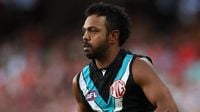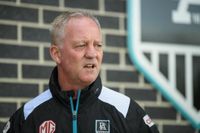In a week marked by controversy and scrutiny, Port Adelaide president David Koch has publicly backed forward Willie Rioli to play in the upcoming Showdown against Adelaide, despite the player being at the center of a series of allegations regarding threatening behavior. The AFL has recently faced criticism for its handling of Rioli's situation, which has raised questions about the treatment of Indigenous players in the league.
Rioli, who had initially escaped punishment for sending a threatening private message to Western Bulldogs player Bailey Dale, was later informed that he would receive a one-match ban after further allegations of aggressive behavior surfaced. The league's decision to sanction Rioli comes after a tumultuous period for the player, who had previously stepped away from football due to the stress of facing racist abuse on social media.
Koch expressed his frustrations regarding the abuse directed at Indigenous players, stating, "The threats that we receive as a club against our Indigenous players would just horrify you." He emphasized the need for the club to support its Indigenous players, highlighting the unique challenges they face both on and off the field. "This is their workplace, some of the things said on-field in the heat of the battle is one thing. Off-field and on social media is totally different," Koch noted.
Despite the sanctions, Koch believes that the situation is more complex than it appears. He explained that the club has the highest representation of Indigenous players and has always prioritized their well-being. "We have a duty to support the players and turn a bit of attention on what society is doing to these players," he added.
Rioli's recent actions have drawn attention not only for their implications on his career but also for the broader discussions surrounding racism in Australian football. Essendon coach Brad Scott weighed in on the matter, stating that the issues at hand should remain between the clubs involved. "Our players have zero concerns," Scott said. "What happens on the field against Port Adelaide should stay on the field."
In a statement released by the Power, Rioli acknowledged the stress of the week leading to his decision to withdraw from the Showdown. "With all the stress from this week, I feel it’s best for me and the team that I take a break," he said. He also reiterated his commitment to working with the club on managing his behavior, stating, "It’s not in my true nature or character to say those things and I apologize for any distress I cause to individuals or their families."
Rioli's withdrawal from the match comes just days after he trained with his teammates at Alberton Oval, where he was reportedly in good spirits despite the ongoing situation. Port Adelaide's footy boss, Chris Davies, indicated that the club was prepared for Rioli's potential absence, acknowledging the significant pressures he has faced. "It hasn’t been an easy period of time for him, but he knows that he needed to front up today and answer those questions and do whatever he can to move the situation forward," Davies remarked.
The AFL's decision to ban Rioli has sparked debates about the league's approach to handling player misconduct, particularly in light of the inconsistent sanctions seen in recent years. Critics have pointed out that while the league has been quick to punish players for minor infractions, it often struggles to address more serious issues effectively. This inconsistency has led to calls for a more coherent and compassionate response to incidents involving Indigenous players.
Power coach Ken Hinkley also expressed concerns about the implications of the ban, suggesting that the AFL is entering a difficult territory. "I think it is going to be some area of concern I would have thought for the AFL," Hinkley noted, emphasizing the need for the league to consider the broader context of such incidents.
As the situation unfolds, Rioli's future with the team remains uncertain. He is expected to be available for the following week's match against Geelong, but the pressure surrounding his conduct continues to loom. The ongoing scrutiny of his actions raises questions about the support systems in place for players grappling with the challenges of professional sports.
In the wake of this controversy, the AFL is under increasing pressure to address the systemic issues affecting Indigenous players and ensure that their voices are heard. The league's response will likely set a precedent for how similar situations are handled in the future, as fans and players alike call for a more equitable and respectful environment within the sport.
As the Showdown approaches, all eyes will be on Rioli and Port Adelaide, with the hope that the focus can shift back to the game itself rather than the off-field drama that has overshadowed it. The challenges facing players like Rioli are significant, but with the right support and understanding, there is potential for growth and healing within the sport.





